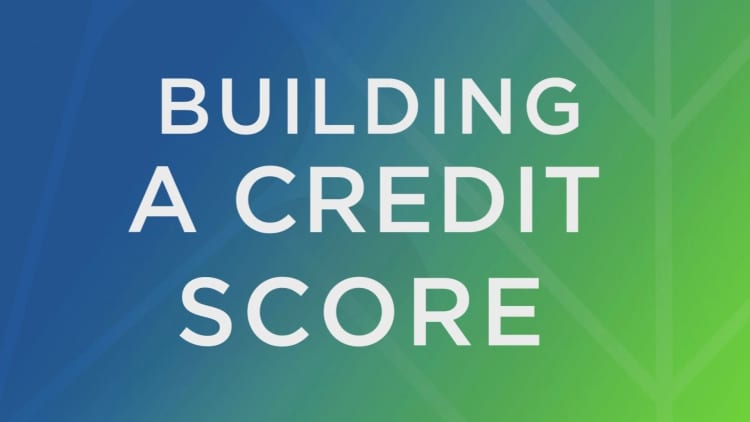Nearly six in 10 Americans say their income has been negatively impacted by the coronavirus pandemic, according to TransUnion's poll of over 3,000 U.S. adults fielded last week. About 78% are worried about paying their bills and making good on loans.
They may be right to worry — missing a payment on your mortgage, student loans or credit cards can have a big impact on your credit score. In 2007, the average FICO credit score was about 690, but during the low point of the financial crisis in 2009, when many Americans were out of work and struggling financially, it dipped to 687.
In today's environment, a good credit score is essential if you want to take out a mortgage, open a credit card, rent an apartment and even land some job opportunities.
The new stimulus package offers some credit protections: Lenders and financial institutions need to report accounts as 'current' (as opposed to delinquent) to the credit bureaus until 120 days after the national emergency declaration ends.
But those rules are limited. First, in order to get credit protection under the Coronavirus Aid, Relief and Economic Security (CARES) Act, you need to be up-to-date on all your payments. If your account isn't current, you're not eligible.
Second, you need to have reached an agreement for forbearance or modified payments with your lender or financial institution. If you applied and received a 90-day forbearance on your mortgage payments — and your previous payments were paid on time and in full — your missed payments will not be reported to the credit bureaus.

Yet even with the CARES Act provisions, millions of Americans' credit will be affected, including those who are struggling through no fault of their own, says Chi Chi Wu, a staff attorney at the National Consumer Law Center. Take restaurant employees, for example. Many have been laid off because of shelter-in-place orders and now may be struggling to pay their bills. If they miss payments without first contacting their lender to set up some type of forbearance or modified payment plan, they will be treated the same as someone who poorly managed their credit, Wu says.
It's important to take action now to protect your credit and make it easier to get back on your feet once the pandemic is over. Here are five things you can do now if you've been financially affected by the coronavirus pandemic.
1. Call your lenders
Under the CARES Act protections, the only ways to protect your credit is to continue to make on-time payments or apply for coronavirus assistance programs before you're in trouble. It's not automatically applied to your accounts.
"Consumers are going to have to pick up the phone and call their servicer to get relief," Wu says. You'll need to call every single lender that you're not going to be able to pay and request relief separately. Each individual account will need to be put on notice.
If you don't have time to wait on hold — some consumers are reporting wait times spanning hours — you can download the DoNotPay app ($3 per month; subscription available only for iPhone), which offers a "skip waiting on hold" function where a bot calls the company, navigates the teleprompts, waits on hold and forwards the call to you when a customer service rep is available.
2. Ask for a natural disaster code to be added to your credit report
There's a special comment code, natural disaster code (AW), that lenders and credit bureaus can add to a credit report when there's been a hurricane or other extreme weather event. After Hurricane Harvey hit Texas and Louisiana in 2017, about 40% of consumers had this code applied to their credit report.
While it's existed for decades, the code could be applied to events beyond just natural disasters, including the current coronavirus pandemic, John Ulzheimer, an expert on credit scores and credit scoring, tells CNBC Make It. "When that code is added to an account, it actually adds a sentence to your account that reads 'affected by declared or natural disaster,'" Ulzheimer says.
It's not something consumers can add themselves, so you'll need to call your lender or the credit bureaus, Equifax, Experian and Transunion. Adding natural disaster code (AW) will not affect your FICO credit score, Ulzheimer says: "It's purely cosmetic, it doesn't protect the score." But the code does protect your VantageScore (another type credit score generated by the credit bureaus) from any delinquent reporting being added to that account, Ulzheimer says.
"It's not what I would call a safety net underneath a trapeze artist, but every little bit helps," Ulzheimer says. He adds that for most consumers, it makes the most sense to contact your lenders and request that the natural disaster code (AW) be added when you're calling to ask about a forbearance or payment plan, rather than making extra calls to the credit bureaus just about adding the code. "Kill two birds with one stone," he says.
3. Don't stress if you're a few days behind
When it comes to late payments, there's a bit of credit protection already built in for consumers, Ulzheimer says. Lenders can't report a missed payment until 30 days after the payment is due. "There's no way to report someone as being late by one to 29 days, it doesn't exist," he says.
But if you don't contact your lender and set up some kind of agreement and you miss your payment by more than 30 days, your credit score will likely take a hit. How much will vary from "not very much to pretty catastrophic," Ulzheimer says. It will depend on the quality of your credit before that late payment hits.
If you have bad credit and you start missing payments, it may not have that much of an impact. "You can only beat a dead horse so much — there's not really not much more damage you can do to yourself," Ulzheimer says. But if you have a really good credit score, above 780, adding a late payment to your credit report is going to be a bigger deal.
4. Keep an eye on how much credit you're using
Continuing to make minimum payments on your loans and credit cards is going to protect your credit, Ulzheimer says. But that alone may not be enough.
You also need to watch your balances. When many Americans were out of work in 2008 and 2009, they started living off their credit cards to make it through until they were able to find a job, Ulzheimer says. But putting a big balance on your credit card can drive your credit score down.
That's because you're using more of your available credit, which is a big factor in calculating credit risk and credit scores. When you use more than 30% of your available credit, your credit score is typically going to be lower because it signals to credit card companies that there's a greater risk you may not pay it all off or that it may take a while to do so.
"Even if consumers are able to make those minimum payments on time, the fact that they're running up credit card debt, that's another reason why their scores are going to go down," Ulzheimer says. If you have any emergency savings, use that to pay bills and purchase essentials if your credit card balances are getting high.
5. Check in on your credit score
Once you have an agreement in place, you'll want to keep an eye on your credit report to double check that lenders are not marking any accounts as delinquent. It will take about a month for any missed payments to affect your credit score, so you should check in on a monthly basis.
You can set up a free monitoring service through sites like Credit Karma and Credit Sesame, which will send you alert emails about any recent activity on your TransUnion credit reports. You can also annually request a free credit report from each of the three major credit bureaus.
"Consumers have to be persistent," Wu says.
Don't miss: Here's exactly what banks are offering to do to help Americans affected by the coronavirus pandemic
Check out: The best credit cards of 2020 could earn you over $1,000 in 5 years



